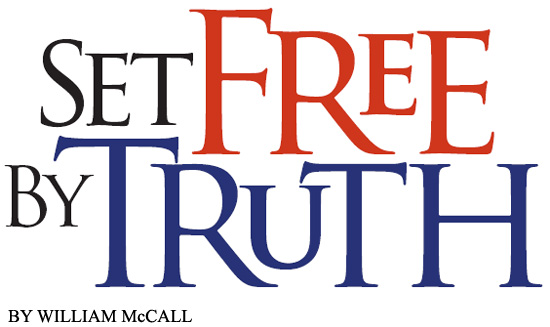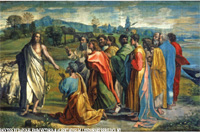Set Free By Truth
William McCall
Ayaan Hirsi Ali is the controversial author of Infidel, her improbable but true autobiography. A Somali-born Muslim woman, she became a member of the Dutch Parliament. As the title of her book implies, after growing up in a world that condones the physical abuse of women, practices honor killing, female genital mutilation, and often marries women against their will, she ends up rejecting Islam as inherently oppressive to women. As a result, she is living under the constant threat of death. An associate, Theo van Gogh, who helped her do an art film to protest against the victimization of women in Islam, was brutally murdered and a note threatening Hirsi Ali was pinned to his dying chest with a knife.

Infidel not only contains a challenge for Muslims, but for Christians as well. There is a need for dialogue between church and state and a compelling interest in the state to see that the weak are not made the innocent victims of religion. Pedophilia and the abuse of women should not be tolerated in a civilized society and are legitimate causes for state interference no matter what the religious justification. Policies that demand reasonable behavior of all, regardless of religious affiliation, will benefit all societies, even those that might initially resist on religious grounds.
One of Hirsi Ali's positions when working with a Dutch think tank has implications for faith-based programs in the U.S. She states:
"The Dutch government urgently needed to stop funding Quran-based schools, I thought. All humans are not equal in a Muslim school. Moreover, there can be no freedom of expression or conscience. . . . They teach by rote, not question, and they instill subservience in girls. They also fail to socialize children to the wider community.
"That raised a dilemma. Holland's Constitution itself permits faith-based schools, in Article 23. If authorities were to close down only Muslim schools, permitting other forms of private schooling to continue, that would be discrimination. I thought it was time to start a debate on the funding of all faith-based schools."1
Resistance to changing the status quo on the state financing of religious schools in Holland is fierce because Christian schools have become addicted to state funding. This creates a dilemma in the minds of many, however. What if the schools are hostile to the values of the public financing the schools? This illustrates a dilemma that all funding of religious institutions by secular government creates. How can we fund only certain schools or religions and maintain an evenhanded government? Could we get caught funding religious thought that undermines our democracy?
Hirsi Ali feels that the lack of freedom and the political oppression in Muslim countries are a direct result of their view of the Koran. With the primary virtue being "submission" (the translation of Islam) and instilled with fears of hellish torment, believers are ripe for manipulation. She points out that many of the terrorists are not the marginalized poor, but Islamic professionals and members of privileged classes, such as Bin-Laden himself. Whatever the truth is in this matter, it opens up the strong possibility that the promotion of democracy in Muslim countries will not succeed unless they are willing to open up religious dialogue. The hyperdefensive attitude that dissenters must be killed or silenced speaks poorly to the strength of the core idea, whether that idea is political or religious. Coercion in the realm of religion leads to either hypocrisy or fanaticism. The very nature of human spirituality demands the freedom of choice. Conscience cannot be coerced. It is not an accident that the First Amendment protects both freedom of religion and freedom of speech. One is impossible without the other.

Religious disputes are dangerous only when taken out of the context of civil tolerance. "Love your enemies," and "pray for those who persecute you" (Matthew 5:44) provide a wonderful foundation for civil discourse on religious ideas that can allow for debate. These principles provide a moral foundation for seeing that disagreement does not become a license for hatred and violence. This is why all religious debate has to take place in the context of peace. "Blessed are the peacemakers" (Matthew 5:9) provides a necessary preparation for the uncoerced conscience that is necessary for all true conversion. Jesus' statement that "[His] kingdom is not of this world" (John 8:36) provides the foundation for the culture within and apart from the state that is the essence of the kingdom of god on earth. The secular state, with guarantees of religious freedom, is the ideal environment to provide for the free exchange of religious ideas and to guarantee that intimidation will not be a part of conversion.
In the religious world there are so many ideas that can have a huge impact on society, and our answers to these questions not only affect our personal lives but help shape society at large. Secular thinkers, as well as theologians, have a right to challenge beliefs that have an impact on public policy. For example, in a speech before the United Nations, Desmond Tutu questioned the rationality of another church's stance on birth control and its influence on public policy. With the AIDS epidemic threatening the life of a continent, is it reasonable to enforce sectarian religious beliefs with the agencies of the state?2 In the light of the high cost in human misery, shouldn't those beliefs that inhibit open discussion about sex, birth control, and the use and dissemination of condoms be challenged?
At its core, Christianity is a challenge to dialogue and change. Jesus gave a commission to His followers: "Go and make disciples of all nations . . ." (Matthew 28:19). Immediately, this represented a challenge to the Jewish establishment, but later would mean a challenge to Gentile cultures. The Great Commission to "make disciples of all nations" is not cultural imperialism if the call to discipleship is freely given and freely received—apart from government and military coercion. The last book of the Bible revives a call from
the book of Isaiah to "come out of [Babylon]" (Revelation 18:4; cf., Isaiah 48:20). Regardless of our interpretation of these verses, they represent a challenge to the established religious order.
If this challenge is not taken out of the context of love and respect for our neighbors, or enforced by the arm of coercion and state authority, we can have healthy and challenging dialogues that will reform our own faith communities and at the very least open up dialogue with others. When the elements of coercion are removed, change and spiritual growth can and will occur. Not only will the lives of individuals improve, but society will be the better for it.
William McCall writes from Chatsworth, California.
Bible texts in this article are taken from the Holy Bible, New International Version. Copyright